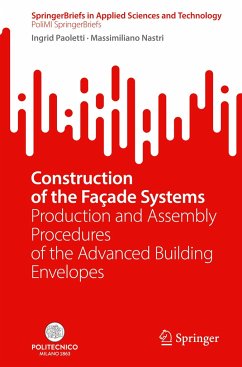The book explores the advanced façade systems according to the productive and constructive contents, in a cognitive and operative form, as a manual text to provide guidelines for researchers, technicians and professionals. It provides operational guidance for the technological design, production planning and site executive coordination for the realization of façade systems. The analysis deals with the main building elements and technical interfaces. The study of the façade systems, after explaining the anchoring structures and their connections to the load-bearing elements, investigates the criteria for the assembly between the framings. In particular, the book examines the technical interfaces of the main advanced envelope systems with respect to the functional, constructive and applicative coordination procedures of the mullions and transoms framing, of the structural sealant glazing façade system, of the unit façade system, of the suspended façade system and of the double skin façade system. The technical and manual character of the book is also expressed through the analysis of the functional and application procedures of the gaskets with respect to the façade systems in order to prevent the transmission of air and water loads: the analysis focuses on the connections between the framing and the enclosure elements of the envelope, in accordance with the compensation of height differences in order to guarantee impermeability, airtightness and insulation. Then, the book describes the assembly and interface conditions between elements of different composition and production within the façade systems: the examination of the technical interfaces involves the development and application of sealants, based on the loads exerted on the jointing devices, in order to fulfill the requirements of sealing and tightness with respect to mechanical, thermal and hygrometric, water, air and wind stresses. Moreover, the study of the envelope systems examines the methodologies directed toward fulfilling the requirements with respect to the actions caused by fire loads, considering the contents related to both components and connections and fixing surfaces.
Bitte wählen Sie Ihr Anliegen aus.
Rechnungen
Retourenschein anfordern
Bestellstatus
Storno








